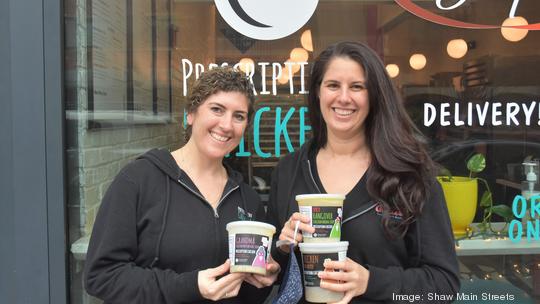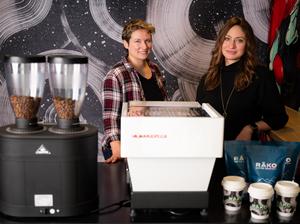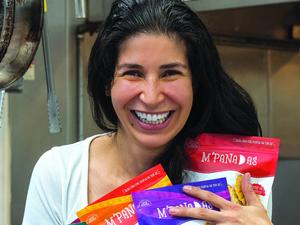
About the business: Prescription Chicken is best known for its classic chicken soup, among other soups, bone broths and related menu items like mini challahs, delivered to the doors of D.C.-area residents. But in the last year, its packaged business has also exploded, growing from the shelves of smaller District markets to the likes of Whole Foods Market and Sprouts.
How it started: When most people have laryngitis, they go quiet, maybe pop some corticosteroids and wait it out. When Valerie Zweig got laryngitis in early 2016, she decided to launch a business. Because all she wanted was chicken soup, and there was none to be had — at least that could be sent to her home.
“When you don’t feel well,” Zweig said, “the only thing you want is chicken soup delivered to your door.”
Zweig has always made chicken soup, and even during her time at the Institute for Culinary Education, her obsession was soup and sauces. Co-founder Taryn Pellicone, Zweig’s cousin, had built a career in hotel restaurant management and high-volume sports and entertainment with Levy Restaurants.
So, “it is not totally surprising that this is where it ended,” said Zweig, Prescription Chicken’s CEO, whose grandfather and his brothers founded the Penn Camera chain, which was later run by Zweig's father.
On Sept. 1, 2016, after Zweig locked herself in a kitchen to play with recipes and figure out how to scale chicken soup from a 14-quart pot to a 100-quart pot, Prescription Chicken was launched. It started out of D.C. culinary incubator Mess Hall, on the edge of Edgewood, for about a year — around the same time the likes of PostMates and Uber Eats arrived on the scene.
Over time, however, those services started limiting the radius of where they would deliver — to maybe a mile from Mess Hall, which didn’t serve Prescription Chicken’s audience. So off they went, Zweig said, “our journey of living in other people’s spaces and being roommates.”
There was a brief detour at Union Market, but Prescription Chicken wanted to be more centrally located. It took up shop in the back of one bar after another — a startup bouncing around, figuring it all out. That is, until the summer of Covid, when it was forced out of its most recent co-tenancy because its home bar was forced to cut back on its space.
The pandemic effect: Covid-19 hit Prescription Chicken at home, literally, as Zweig tested positive for the virus early in the pandemic. Like many others, she lost her sense of taste and smell.
What got her through it? Chicken soup, of course.
“Certainly it does make you feel better if you had Covid, a cold, the shot,” she said. “People send it as well. It’s comforting not only physically but mentally.”
The business may very well have been saved on April 8, 2020, the day Prescription Chicken’s application for a Paycheck Protection Program loan was approved. The Small Business Administration authorized $58,100, according to SBA data.
“It was really, truly an amazing thing for us,” Zweig said.
Still, the business found itself without a home yet again. “We wandered the streets,” Zweig said, ending up in Shaw, and fell in love with the space formerly occupied by Mason Dixie Biscuit Co., which closed the previous year. But 1819 Seventh St. NW was far too large for Prescription Chicken.
The pandemic pivot: Fortunately they weren’t in this alone. Zweig and Pellicone partnered with the owners of Saya Saltena and Astro Doughnuts to create a collaborative kitchen, “with friends where we can share utilities, share labor on occasion, kitchen supplies.”
“The landlord wanted to activate the space, to give us a chance to survive,” Zweig said. They struck a progressive, short-term lease, removed all the seats, put signs on the door and opened Sept. 1, four years to the day after Prescription Chicken first launched.
The challenge today: Prescription Chicken has done quite well for itself, not only with its delivery services — both in D.C. and at The Bourse, a food hall in Philadelphia — but also its packaged goods business. It has increased sales year-over-year, Zweig said, and has been profitable for two consecutive quarters, though she declined to release figures.
Its soups first hit the shelves of Glen’s Garden Market in October 2016, then other local retailers in 2017. Balducci’s and Kings followed in 2019, then Whole Foods stores across the Mid-Atlantic in April 2020 and Sprouts in March 2021.
For Whole Foods, “we had some connections there,” Zweig said. “For Sprouts, we knew nobody. We blind pitched. We just sent samples.”
But in that growth, especially in packaged foods, lies the challenge. There’s nothing like a good, in-person sample of home-cooked chicken soup to get your brand out there. During the pandemic, that hasn’t been an option.
“I would say we rolled out in those large accounts right at the beginning and in the middle of the pandemic — a challenge as we weren’t able to market to consumers in the traditional way,” Zweig said.
What’s next: Prescription Chicken just launched its first capital raise, a seed round of $750,000 “to support the growth of the consumer packaged-goods business and see how we can grow it,” Zweig said.
“There isn’t a nationally branded chicken soup on the shelves of premium, natural grocery stores,” Zweig said, recalling when Prescription Chicken first pitched itself to the bigger markets.
The business currently employs 11 — eight in D.C. and three in Philadelphia — while its consumer goods are produced and packaged in two U.S. states. It’s a growing venture, and, if you shop in boutique markets, you’re likely to see a lot more of it.
But the founding message, Zweig said, hasn’t changed.
“Chicken soup is perhaps the true definition of comfort food,” she said. “Every person has a relationship.”
Email mneibauer@bizjournals.com to share your business with us.


